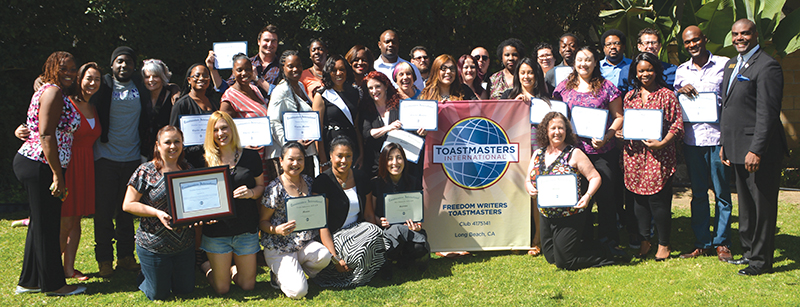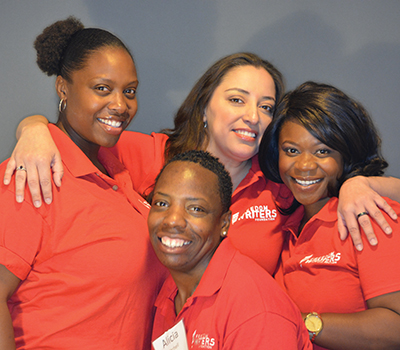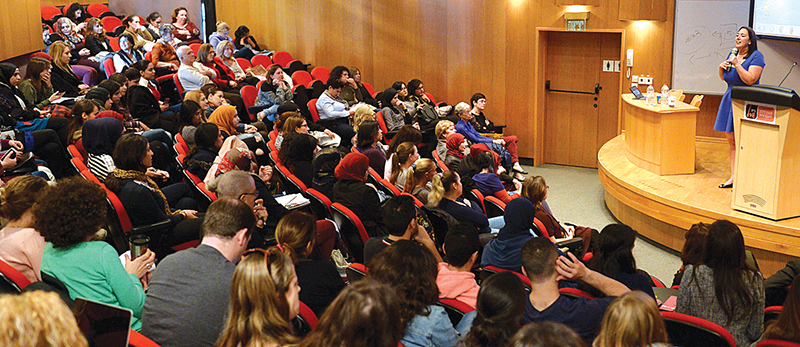When Erin Gruwell and the former high school students who gained fame in the 2007 movie Freedom Writers decided to transform the power of the pen into the power of the voice, they turned to Toastmasters for help in spreading their message of hope, perseverance and self-empowerment around the world.
The speaking skills the Freedom Writers developed allowed them to bring—many for the first time—the powerful lessons of their well-known personal diaries to the podium, inspiring new generations of at-risk youth and vulnerable populations to transcend life’s most trying circumstances in the same manner they did.
Many years earlier, in the 1990s, Gruwell, a young English teacher at Woodrow Wilson High School in Long Beach, California, had found herself struggling to reach these same students in her classes. Gang and racial violence were running rampant in the city, and students were more concerned about surviving to the next day than making it to graduation. Desperate to capture the students’ interest, Gruwell brought in literature written by teenagers to whom they could relate and who faced similar life challenges.
“We read the harrowing and heartbreaking tales of other people who refused to let their circumstances identify them as victims,” Gruwell says. “Whether it was the diary of Anne Frank or survivors of gang violence, I decided early on I wanted my students to read those stories and look for parallels in their own lives.”
“Now that we are proud Toastmasters members, we understand more than ever the power of the voice and the importance of speaking out authentically and passionately about what you believe in.”
— ERIN GRUWELLSoon Gruwell was encouraging her students to write about their own life circumstances. Students recorded their thoughts and feelings in raw and often-jarring diaries about domestic violence, the killing of family members and friends, broken homes, drug use, finding love, and other teenage concerns. They called themselves the Freedom Writers after the 1960s American civil rights activists the Freedom Riders.
“The diaries spoke about refusing to be victims and what it takes to survive in their worlds,” Gruwell says, who was recently named Toastmasters’ 2017 Golden Gavel recipient.
The powerful essays gained notice and became a best-selling book, The Freedom Writers Diary: How a Teacher and 150 Teens Used Writing to Change Themselves and the World Around Them. The critically acclaimed movie Freedom Writers followed, starring the American actress Hilary Swank as Gruwell.
The Toastmasters Connection
Following the release of the book and movie, Gruwell began receiving requests for the Freedom Writers to speak around the world. Although the students had bared their souls in the diaries, the prospect of standing before audiences and telling their very personal and often-wrenching stories was daunting. The Freedom Writers’ diaries had been kept anonymous by design, with numbers rather than names assigned to journal entries in the book to protect privacy and to emphasize the universality of the students’ experiences.
“The idea of public speaking was terrifying to those not used to being exposed,” Gruwell says. “But I began thinking that we had brought all these great stories of perseverance into the classroom and now it was time to bring them into the larger world. That’s where Toastmasters came into the picture.”
 As Speaker of the House, Regan must maintain order during discussions and debates.
As Speaker of the House, Regan must maintain order during discussions and debates.
Gruwell knew a colleague in Toastmasters and wondered if there was something the organization could do to prepare her former students for speaking engagements. Soon the Professional Women Toastmasters club in Playa Vista, California, comprised of past presidents from other clubs, agreed to deliver an eight-week Speechcraft session for the Freedom Writers. In this club outreach program, experienced Toastmasters present the fundamentals of public speaking to non-members in an atmosphere that resembles a club setting.
“This very dynamic and giving group of women decided to take us under their wing and create a program for us,” Gruwell says. The group transformed one room of the historic home in Long Beach where the Freedom Writers Foundation is based—an organization Gruwell founded and leads as executive director, to continue the mission and teachings of the Freedom Writers—into a classroom for the Speechcraft sessions.
“These Toastmasters leaders made it their mission to model what great speaking is for us, to help ease the Freedom Writers’ anxiety about presenting and to encourage us all to take risks as speakers,” Gruwell says. “Toastmasters became a game-changer for us.”
Inspired by the program, the Freedom Writers decided to charter their own Toastmasters club, Freedom Writers Toastmasters, in September 2014.
Silent No More
Brimming with confidence and newly polished speaking skills from their Toastmasters experience, the Freedom Writers began presenting frequently to diverse audiences around the globe. Now in their 30s with good jobs, advanced degrees, families and successful lives, Gruwell’s former students—all of whom graduated from high school and attended college—found it rewarding, sometimes liberating and often emotional to revisit the experiences from their turbulent teenage years.
The group has remained close over the years, and participating in the Toastmasters club is one way they maintain that bond; the team-oriented and camaraderie-building nature of the meetings often feels like a natural extension of their high school classroom. But few of the Freedom Writers had told the tales from their famous diaries in public settings, and Toastmasters prepared them for that leap.
Collectively, the Freedom Writers have now presented in more than a dozen countries and in all 50 American states, including at venues like the Congressional Theater in the U.S. Capitol in Washington, D.C, to audiences in Israel and Palestine as part of a peace-making trip, at the Anne Frank Museum in Amsterdam and on the Oprah Winfrey Show. The Freedom Writers also speak regularly to smaller groups in homeless shelters, juvenile halls, in safe havens for young girls victimized by human trafficking, in Boys and Girls Clubs of America and in schools around the world where students face some of the same life-threatening challenges as they did growing up in dangerous sections of Long Beach.
Few of the Freedom Writers had told the tales from their famous diaries in public settings, and Toastmasters prepared them for that leap.
While diary-writing was a cathartic and often transformative experience for the Freedom Writers, Gruwell says the anonymity of the essays created a “veil” for them. Toastmasters helped lift the veil and embolden them to share their stories in public, facilitating their evolution as storytellers along the way.
“There is a different power in speaking than you have in writing, but it also makes you more vulnerable,” says Gruwell, who was recently named one of 50 finalists from around the world for the Varkey Foundation’s prestigious 2017 Global Teacher Prize for her body of work as an educator. Gruwell continues to teach as a professor at Bay Path University in Massachusetts.
“Toastmasters gave the Freedom Writers a safe space to practice telling their stories without fear and helped ease the transition from diary writing to presenting,” Gruwell says.
Practice in the Toastmasters club meetings helped to polish and elevate the natural storytelling and soul-baring skills many of the Freedom Writers already possessed. “I marvel at the Freedom Writers’ ability to be emotional storytellers, to unabashedly stand in front of an audience and shed tears about their own stories but also be able to sprinkle in humor,” she says. “Just when you think you can’t cry enough, they make you laugh. As a teacher I find myself continually becoming their student.”
Gruwell has invited teachers who come to the foundation for training to attend the Freedom Writers club meetings. “I want them to see the students run the meeting and experience firsthand their transformation as storytellers and leaders,” Gruwell says. Impressed by what they witness, many of the teachers go on to start Toastmasters clubs in their own school districts and classrooms.
Boost From Table Topics
Table Topics has proved particularly valuable to the Freedom Writers, Gruwell says, given the diversity of audiences, questions and social situations they encounter in their travels. “On one day they can be speaking to CEOs or billionaires and the next day to disenfranchised youth,” Gruwell says. “They need to be social chameleons and have a comfort level with a variety of audiences. Table Topics practice has really helped them become fast on their feet and adapt to different kinds of conversations and topics in these settings.”
That impromptu-speaking skill also has paid dividends during the “video chats” Freedom Writers now conduct with students and teachers in schools around the world—sessions delivered via Skype where they tell their stories and field wide-ranging questions from viewers.
 FROM LEFT: Freedom Writers Shanate Jones-McConnell, Erica Alcaraz (top), Alicia Mitchell (bottom) and Tiffony Jacobs.
FROM LEFT: Freedom Writers Shanate Jones-McConnell, Erica Alcaraz (top), Alicia Mitchell (bottom) and Tiffony Jacobs.
Julie Broady, DTM, one of the Toastmasters who led the original Speechcraft program and who now chairs the board of directors of the Freedom Writers Foundation, has seen the Freedom Writers make major strides in their off-the-cuff speaking and Q&A skills. “Expressing themselves through writing was a huge step in helping them feel validated and understood, but I think expressing themselves through speaking has been an even bigger step because of the impact it has on others, which they often get to see directly,” says Broady, now a program quality director for District One Toastmasters.
Inspiring the Vulnerable and Voiceless
Gruwell believes the Freedom Writers’ biggest influence is demonstrating to vulnerable or at-risk audiences that they, too, can overcome enormous odds to find success in life.
“What I love is watching audiences listen to them tell a personal story that may be very painful about mental or physical abuse, or even about contemplating suicide, and have them understand they are not alone,” Gruwell says. “They see how someone has received help and support and has been able to transcend their circumstances.”
Yet even with the passing of two decades it can be difficult for the Freedom Writers to revisit their experiences of broken homes, street violence and other tragic situations; telling those stories can reopen old wounds. To help her former students better cope with that challenge, Gruwell uses the example of Holocaust survivor Renee Firestone, now 93, whom she once invited to speak to the group about her time in the Auschwitz death camp, where her mother and sister were killed.
“Renee has been telling her powerful story for almost 70 years, and each time she tells it she is forced to go to that difficult emotional place again; there are often tears,” Gruwell says. “That’s helped the Freedom Writers understand it’s very natural to experience and show those same emotions again when recounting their own stories.”
The Mission Continues
Gruwell continues to “pay it forward” through her work at the foundation, an organization that provides teacher training, develops curriculum, awards scholarships to first-generation high school seniors and college students, and conducts outreach through initiatives like the Freedom Writers’ presentations.
A new documentary titled Freedom Writers: Stories from an Undeclared War is set to be released in early 2018; the foundation is in discussions with the Public Broadcasting Service (PBS) in the U.S. to air the documentary. The film follows the Freedom Writers’ story from their freshman year in high school to the present day.
Last year, Gruwell and four of her former students traveled to the Middle East on the invitation of the U.S. State Department. “They believed if we could bring together and unify rival gangs in a classroom in California, we might have some lessons to share in that divided part of the world,” Gruwell says.
 Gruwell speaks to local undergraduate students and faculty at the U.S. Embassy Tel Aviv last December. Photo credit: Matty Stern/U.S. Embassy Tel Aviv
Gruwell speaks to local undergraduate students and faculty at the U.S. Embassy Tel Aviv last December. Photo credit: Matty Stern/U.S. Embassy Tel Aviv
Gruwell and the Freedom Writers conducted more than 20 events in Israel and seven for the Palestinian Authority in the West Bank, using some of the same methods Gruwell employed in her high school classroom to open dialogue and examine long-held belief systems.
In the trip, Gruwell found similarities with her first journey into Long Beach after the Rodney King riots in Los Angeles in 1992. “Both communities had been plagued with misunderstandings and gross stereotypes,” she wrote in a blog post after the Middle East trip. “In both scenarios people were anxious for the world to take notice of their plight and humanize their existence. Like many of the educators I interacted with in Israel, the [Palestinian college professors and educators wanted to be] seen for who they are, not who they pray to.”
Gruwell believes the current political and social climate in much of the world makes it more important than ever that the Freedom Writers continue to share their message.
“The roots of our foundation are based in standing up for and protecting the most vulnerable, marginalized and invisible people,” Gruwell says. “That’s also the student clientele of many of the teachers who come to our institute for training. We want to continue to give a voice to the voiceless. Now that we are proud Toastmasters members we understand more than ever the power of the voice and the importance of speaking out authentically and passionately about what you believe in."
Dave Zielinski is a freelance writer in Minneapolis, Minnesota, and a frequent contributor to the Toastmaster magazine.



 Previous
Previous
 ERIN GRUWELL: Toastmasters' 2017 Golden Gavel Award Recipient
ERIN GRUWELL: Toastmasters' 2017 Golden Gavel Award Recipient
 Previous Article
Previous Article